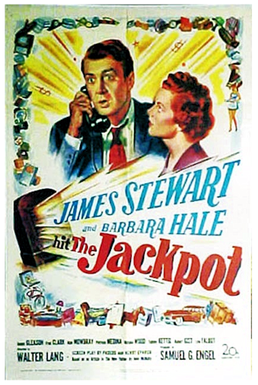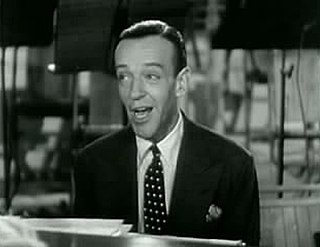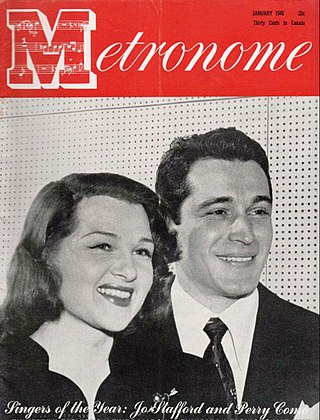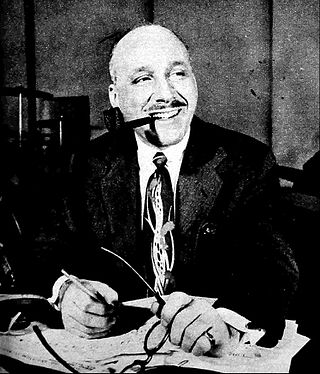Related Research Articles

The Jackpot is a 1950 American comedy film directed by Walter Lang, with James Stewart and Barbara Hale in the lead roles. It features a young Natalie Wood.

WYLL is a commercial radio station in Chicago, Illinois. It originated as WJJD and broadcast some pioneering shows. It is owned by Salem Media Group and airs a Christian talk and teaching radio format. The studios and offices are located in Elk Grove Village. Its daytime transmitter and two-tower array are located off Ballard Road near Interstate 294 in Des Plaines. The nighttime transmitter and six-tower array are off Deer Drive near Interstate 355 in Lockport. WYLL is powered with 50,000 watts, the maximum for commercial AM stations in the U.S. But it must use a directional antenna at all times to protect clear-channel station KSL in Salt Lake City, the dominant Class A station and several Class B stations on 1160 AM.
"If I Knew You Were Comin' I'd've Baked a Cake" is a popular song written by Al Hoffman, Bob Merrill, and Clem Watts and published in 1950.

Bernard D. Hanighen was an American songwriter and record producer, best known for "When a Woman Loves a Man", and writing lyrics to the jazz composition "'Round Midnight", composed by jazz musician Thelonious Monk. Hanighen also worked with Clarence Williams and Johnny Mercer.

The First Hundred Years was the first ongoing TV soap opera in the United States that began as a daytime serial, airing on CBS from December 4, 1950 until June 27, 1952.

The Chesterfield Supper Club is an NBC Radio musical variety program (1944–1950), which was also telecast by NBC Television (1948–1950).

The Paramount Television Network, Inc. was a venture by American film corporation Paramount Pictures to organize a television network in the late 1940s. The company-built television stations KTLA in Los Angeles and WBKB in Chicago; it also invested $400,000 in the DuMont Television Network, which operated stations WABD in New York City, WTTG in Washington, D.C., and WDTV in Pittsburgh. Escalating disputes between Paramount and DuMont concerning breaches of contract, company control, and network competition erupted regularly between 1940 and 1956, culminating in the DuMont Network's dismantling. Television historian Timothy White called the clash between the two companies "one of the most unfortunate and dramatic episodes in the early history of the television industry."

Strike It Rich is a game show that was broadcast on American radio from June 29, 1947 to December 27, 1957, on CBS and NBC. It was broadcast on television as well, starting in 1951. People in need of money appeared and told their tale of woe, then tried to win money by answering four questions. If the contestant did not win any money, the emcee opened the "Heart Line", which was a phone line to viewers who wished to donate to the contestant's family.
Fashions on Parade is an American fashion-themed television series that aired on the DuMont Television Network from November 4, 1948, to April 24, 1949, and on ABC from April 27, 1949, to June 29, 1949. The show was hosted by Adelaide Hawley.
Perry Como was an American singer, radio and television performer whose career covered more than fifty years. He is probably best known for his television shows and specials over a period of almost thirty years. Como came to television in 1948 when his radio show was selected by NBC for experimental television broadcasts. His television programs were seen in more than a dozen countries, making Como a familiar presence outside of the United States and Canada.
Stop the Music is a prime time radio game show that aired on ABC Radio on Sundays, from March 21, 1948 to August 10, 1952. Stop the Music crossed over to ABC television on Thursdays, beginning on May 5, 1949 through April 24, 1952, and again for a half-hour from September 7, 1954, to June 14, 1956.
Philip Morris Playhouse is a 30-minute old-time radio dramatic anthology series.

The Martin and Lewis Show is a radio comedy-variety program in the United States starring the comedy duo Martin and Lewis, consisting of Dean Martin and Jerry Lewis. It was broadcast on the NBC Radio Network beginning April 3, 1949, and ending July 14, 1953.

Eugenie Baird was an American big-band, jazz, and radio singer.

Raymond Arthur Bloch was an American composer, songwriter, conductor, pianist, author and arranger. He is best remembered as the arranger and orchestra conductor for The Ed Sullivan Show during its entire run from 1948 to 1971.

Bobby Benson and the B-Bar-B Riders is an old-time radio juvenile Western adventure program in the United States, one of the first juvenile radio programs. It was broadcast on CBS October 17, 1932 - December 11, 1936, and on Mutual June 21, 1949 - June 17, 1955.

Say It With Acting is an American television game show that was broadcast on NBC from January 8, 1951, until May 1951, and on ABC from August 1951 until February 22, 1952.
This Is Show Business is an American variety television program that was broadcast first on CBS and later on NBC beginning July 15, 1949, and ending September 11, 1956. It was CBS-TV's first regular series broadcast live from coast to coast. It was originally titled This Is Broadway.
Hit the Jackpot is an American radio quiz program that was broadcast on CBS from May 9, 1948, through December 27, 1949, and from May 28, 1950, through September 3, 1950. It was originally titled Try 'n' Stop Me and then called Catch Me If You Can before Hit the Jackpot took effect on June 13, 1948.
References
- ↑ Dunning, John (1998). On the Air: The Encyclopedia of Old-Time Radio (Revised ed.). New York, NY: Oxford University Press. pp. 616–617. ISBN 978-0-19-507678-3.
- 1 2 3 4 5 "The News of Radio: CBS to Inaugurate 'Sing It Again' Saturday, Featuring Dan Seymour and Cash Prizes" . The New York Times. May 25, 1948. p. 54. Retrieved April 22, 2024.
- ↑ "Giveaway Craze Continues; MBS Show Offers 19G Wkly". Billboard. June 12, 1948. p. 5. Retrieved April 24, 2024.
- 1 2 3 "Sing It Again Has Milestone". The Roanoke Times. May 22, 1949. p. 20. Archived from the original on April 26, 2024. Retrieved April 26, 2024– via Newspapers.com.
- ↑ "Sing It Again's $20,000 Question". Radio and Television Mirror. July 1949. pp. 44–45. Retrieved April 26, 2024.
- ↑ "(untitled brief)". Heinl Radio-Television News Service. June 29, 1949. p. 16. Retrieved April 26, 2024.
- ↑ "Telephone Shows". Sponsor. July 3, 1950. p. 42. Retrieved April 26, 2024.
- 1 2 McNeil, Alex (1996). Total Television: the Comprehensive Guide to Programming from 1948 to the Present (4th ed.). New York, New York: Penguin Books USA, Inc. p. 757. ISBN 0-14-02-4916-8.
- ↑ "Judy Garland Set In 'Alice Adams'". Deseret News. October 27, 1950. p. 34. Retrieved April 26, 2024– via Newspapers.com.
- 1 2 3 "Sing It Again". Billboard. June 19, 1948. p. 10. Retrieved April 24, 2024.
- ↑ Crossland, Ken; Macfarlane, Malcolm (August 29, 2013). Late Life Jazz: The Life and Career of Rosemary Clooney. Oxford University Press. p. 253. ISBN 978-0-19-979857-5 . Retrieved April 24, 2024.
- ↑ "Debuts, Highlights, Changes (Continued)". Ross Reports. October 1, 1950. p. 2. Retrieved April 26, 2024.
- ↑ "Moss Succeeds as 'Sing It' Producer". Billboard. February 24, 1951. p. 7. Retrieved April 24, 2024.
- ↑ "Words and Music". Billboard. February 25, 1950. p. 14. Retrieved April 24, 2024.
- ↑ "Chesterfield May Ink 'Sing It Again'". Billboard. April 9, 1949. p. 8. Retrieved April 24, 2024.
- ↑ "CBS Sells First 'Sing It' Slice". Billboard. July 30, 1949. p. 5. Retrieved April 24, 2024.
- 1 2 "Who'll Angel The Giveaways From Now On?". Billboard. September 3, 1949. p. 5. Retrieved April 24, 2024.
- ↑ "Sterling Buys Hunk of 'Songs'". Billboard. July 28, 1951. p. 4. Retrieved April 24, 2024.
- ↑ "Ludens Buys Last Portion of 'Sing It'". Billboard. October 8, 1949. p. 5. Retrieved April 24, 2024.
- ↑ "CBS To Unveil Two New P'kgs". Billboard. May 29, 1948. p. 17. Retrieved April 24, 2024.
- ↑ "'Songs' Simulcast Replaces 'Sing It' June 30 on CBS". Billboard. June 16, 1951. p. 35. Retrieved April 24, 2024.
- ↑ "NAB Ruling Offers Prize Plugs' Poser". Billboard. June 19, 1948. p. 5. Retrieved April 24, 2024.